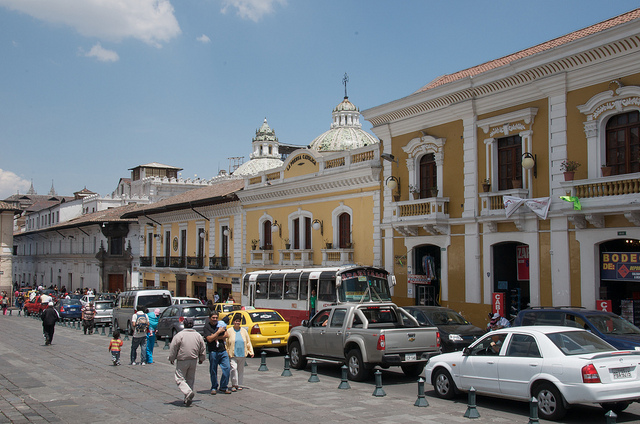
If I had been the journalist who received the hot documents from Edward Snowden telling of electronic espionage by government security agencies, I would be in a serious predicament.
I wouldn’t be able to publish this scoop in Ecuador. A recently enacted draconian Communication Law would prohibit it.
The law’s Article 30 prohibits disclosure by the media of protected information considered to be secret or which originates from personal correspondence, even from public officials, without their authorization. The law establishes administrative and criminal sanctions for the journalist and the medium publishing this type of information. In short, the press is allowed to run nothing that a public official does not wish to have seen.
So if Snowden, or an Ecuadorean kindred spirit, had leaked “secret” documents within Ecuador, not only would he be facing legal troubles; the reporters and media outlets that had published the information would also be in a jam. Imagine if the U.S. government went after The Washington Post and The New York Times each time these newspapers published something the government would rather keep from the public. For the Ecuadorean government to present itself to the world as a champion of freedom of press and transparency, it is more than a little ironic.
I have worked as a journalist at national newspapers for the past 20 years here, and in the past six years I have experienced an atmosphere of ever-increasing hostility towards the press, as President Rafael Correa persists in casting us as the corrupt opposition.
The new law is the most recent battle won by Correa in his war against the domestic press since arriving at the helm of the country’s leadership in 2007. But Correa bashes the foreign press, too. On the last Saturday in June, in his weekly broadcast, the Ecuadorian president railed against The Washington Post and Univision. “Any rubbish published by the international press which can harm the Ecuadorean Government, they repeat, and in this way attempt to discredit the country,” Correa told his listeners. “That international press which tried to accuse, to position the tall story that the Ecuadorian government spies, has come off as a liar.”
The president was referring to newspaper articles and editorials that question him on his doublespeak. The Post explained that the Communication Law seriously restricts the media’s work. Other outlets published documents from the National Intelligence Secretary of Ecuador, according to which the government is seeking to purchase equipment and technology for electronic surveillance. The purpose of this acquisition, maintained Correa, is to pursue organized crime.
Like Venezuela’s Hugo Chávez and plenty of other populist Latin American leaders before him, Correa, a 50-year-old economist with a doctorate from the University of Illinois, knows how to get the most out of his anti-imperialist script. The high points of his diplomacy have been the departure of the U.S. base from the port of Manta, the expulsion of Ambassador Heather Hodges from Quito for supposedly interfering in Ecuador’s internal affairs, and, of course, the granting of asylum to WikiLeaks founder Julian Assange, who has remained at the Ecuadorian embassy in London for over a year now.
While Correa trumpets his protection of Assange and flirtation with Snowden as symbols of his devotion to the freedom of information, Ecuadorean journalists are besieged. The Communication Law creates the following new crime: “It is prohibited to circulate information that, either directly or through third parties, is concertedly produced or reiteratively published in one or more communication media, with the purpose of smearing the reputation of a natural or legal person (company) or reducing their public credibility.”
In 2003 a team of journalists that I led at the El Comercio newspaper investigated claims of alleged corruption involving the Supreme Court Justice Olmedo Bermeo. After several months, we revealed that Bermeo had failed to disclose, as required under the law, deposits totalling over 400 thousand dollars along with several properties. The justice was prosecuted but fled from justice, only to be caught and imprisoned, accused of perjury and unjust enrichment. The Prosecutor’s Office and State Comptroller’s Office confirmed what we published and launched judicial proceedings. Our investigation went on to discover improper links between ten judges, including Bermeo, and a political party. The case, the first prosecution of a national judge, proved newsworthy for several years. And yet, despite all of the evidence, and although several judges had previously found him guilty, Bermeo was ultimately absolved.
Last year, to add insult to injury, Bermeo sued those of us who had carried out the investigation and the newspaper for alleged moral damages, demanding the payment of $14 million in compensation. The public interest is now subordinated to the private interests of the alleged affected party, even when the published facts are true.
When the government attempts to impose an official truth, forbidding the press from exposing any arguments or evidence to the contrary, it creates polarization in society. Cleverly, Correa has attacked the independent press as an instrument of the opposition, and he has spun his electoral triumphs as legitimizing his approach to the media. In February he was re-elected to a further four years in government with 56 percent of the vote (11 million voters).
Correa enjoys support because he has embarked on important public works, such as social and economic programs with significant investments originating from multimillion-dollar earnings from oil exports and tax collection. And there is no question that, for millions of Ecuadoreans, issues of economic stability will always loom larger than issues of freedom of speech.
For influential international audiences and civil society at home, however, WikiLeaks and the Snowden case have provided President Correa with a wonderful opportunity to deflect attention away from his authoritarian ways and pretend to be a champion of transparency and free speech. It all amounts to a bitter irony for those of us trying to stand up for these principles within Ecuador.




Send A Letter To the Editors